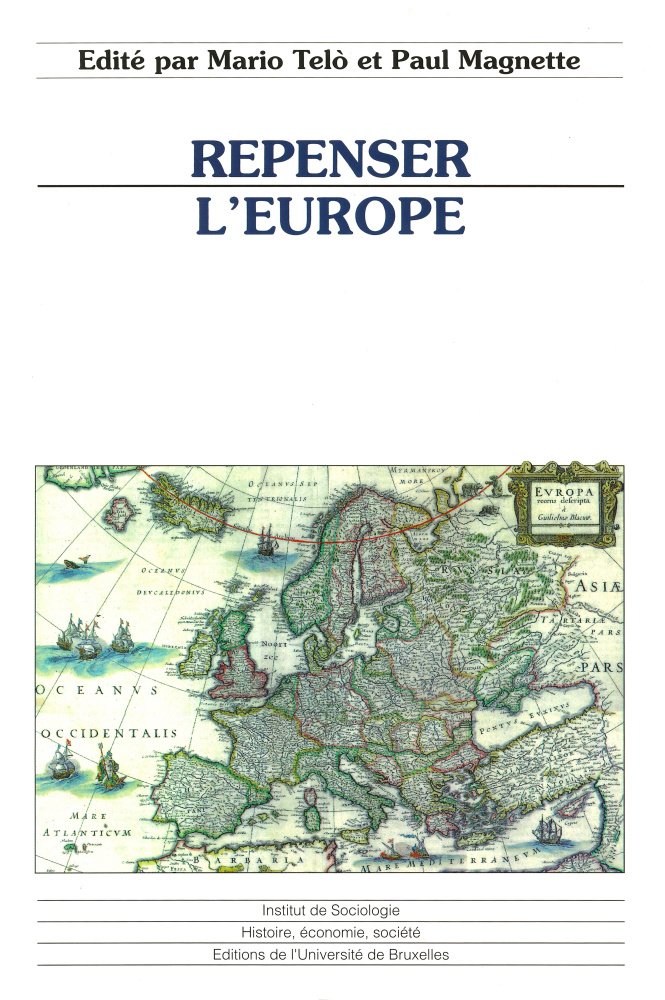The Others in Europe
Legal and social categorization in context
First Edition
Les auteurs qui ont contribué à cet ouvrage, issus de disciplines et de pays différents, apportent des éclairages complémentaires sur la transition historique connue par l'Europe à la fin du XXe siècle. Read More
La construction européenne se trouve aujourd'hui à un tournant de son histoire. La chute du mur de Berlin et les bouleversements récents du contexte international ont ébranlé les principes sur lesquels la construction de l’Europe reposait depuis ses origines: le continent n’est plus divisé et l’Union européenne se prépare à un élargissement oriental; l’économie se globalise et l’État-Providence ne parvient plus à jouer son rôle; l’intégration européenne elle-même est incapable de progresser à l’intérieur de ses étroites limites économiques.
Ces mutations fondamentales, qui perturbent l’entreprise européenne, lui donnent aussi l’occasion d’aller au-delà de ses ambitions passées, d’édifier une Europe politique et de contribuer à la formation d’une démocratie à l’échelle du continent. Projet résolument neuf, qui contraint à repenser l’Europe jusque dans ses racines philosophiques.
Dans la première partie de cet ouvrage sont analysés les problèmes de transition que traversent les démocraties nationales de l’Union européenne dans le nouveau contexte international. Une seconde partie dégage quelques perspectives concrètes susceptibles de relancer le projet européen. Enfin une troisième partie présente les questions fondamentales qui devront être résolues pour donner au projet européen des bases adaptées aux temps nouveaux : l’Union doit-elle se fermer sur elle-même ou s’ouvrir à l’autre moitié de l’Europe; peut-elle se contenter d’être plus efficace ou sa démocratisation est-elle imminente; quelle place les États souverains peuvent-ils trouver en son sein; quel équilibre peut-elle trouver entre la protection de son identité et la promotion de ses différences… ?
Specifications
- Publisher
- Éditions de l'Université de Bruxelles
- Edited by
- Saskia Bonjour, Andrea Rea, Dirk Jacobs,
- Contributions by
- Alejandra Alarcon-Henriquez, Assaad Azzi, Didier Bigo, Philippe Bonditti, Saskia Bonjour, Emmanuelle Bribosia, Didier Fassin, Nicole Grégoire, Kees Groenendijk, Chloé Hublet, Dirk Jacobs,
- Collection
- European Studies | n° 50
- ISSN
- 13780352
- Language
- English
- Supporting Website
- Oapen.org
- Publisher Category
- Publishers own classification > Law
- Publisher Category
- Publishers own classification > Political Science
- Publisher Category
- Publishers own classification > Sociology & Anthropology
- BISAC Subject Heading
- SOC031000 SOCIAL SCIENCE / Discrimination & Race Relations
- Onix Audience Codes
- 06 Professional and scholarly
- CLIL (Version 2013-2019)
- 3080 SCIENCES HUMAINES ET SOCIALES, LETTRES
- Subject Scheme Identifier Code
- Thema subject category: Ethnic studies
Paperback
- Publication Date
- 18 April 2011
- ISBN-13
- 978-2-8004-1506-2
- Extent
- Main content page count : 208
- Code
- 1506
- Dimensions
- 160 x 240 x 10 cm
- Weight
- 356 grams
- ONIX XML
- Version 2.1, Version 3
Google Book Preview
Contents
- Introduction | Andrea REA, Saskia BONJOUR and Dirk JACOBS
- Changing migration flows and European identity
The Europeanization of immigration and the re-categorization of the Other
Integration and risk management
The Europeanization of anti-discrimination policies
Denials of recognition and identity mobilization
- CHAPTER I. Categorizing human beings in EU migration law | Kees GROENENDIJK
- Immigrants, labels and laws
Dutch and German terminology for immigrants
Which categories are used in EU migration law
Historical development of the terminology
Conclusion
- CHAPTER II. Mandatory integration provisions in EC and EU Member States law
| Yves PASCOUAU - Integration provisions in EC and national law with regard to family reunification
and long term residents
Towards the extension of mandatory integration provisions
Conclusion
- CHAPTER III. Problematical Otherness: Defining and dealing with the Other in French
and Dutch civic integration abroad policies | Saskia BONJOUR - Introduction
The legal definition of the target group
Naming the problem and the problematic Other
Dealing with Otherness
Conclusion
- CHAPTER IV. Some foreigners more equal than others under EU law | Chloé HUBLET
- Introduction
The personal scope of Article 18 TFEU: an evolution at last?
The ECJ's position in Vatsouras and Koupatantze
The consequences of Vatsouras on the protection of TCNs against discrimination on grounds
of nationality
Conclusion
- CHAPTER V. Borders and security: the different logics of surveillance in Europe
| Didier BIGO, Julien JEANDESBOZ, Francesco RAGAZZI and Philippe BONDITTI - Border and security: decolonising the understanding of border from a security approach
Technology and EU bordering : not stopping people ; enhancer of freedom of circulation
or surveillance mechanism speeding up their travel?
Mobility and its government : speed instead of freedom
Border management practices in the EU
Ethical and political implications of security technologies in Europe
- CHAPTER VI. Reasonable accommodation of religious diversity in Europe and in Belgium:
Law and practice | Emmanuelle BRIBOSIA, Andrea REA, Julie RINGELHEIM and Isabelle RORIVE - Reasonable accommodation in Europe: The legal framework
Reasonable accommodation in Belgium
Conclusion
- CHAPTER VII. The social construction of Otherness | Didier FASSIN
- From borders to boundaries
From reluctance to recognition
From notion to concept
Conclusion
- CHAPTER VIII. Ethnic discrimination and minority identity: A social
psychological perspective | Maykel VERKUYTEN - Group identity lens model
Group identity reaction model
The integration paradox
Conclusion
- CHAPTER IX. Why do minorities rarely report experiences with discrimination?
Exploring qualitatively what inhibits or favours claims of discrimination
| Alejandra ALARCON-HENRIQUEZ and Assaad AZZI - Introduction
Methodology
Results
- CHAPTER X. Communitarian rhetorics within a changing context:
Belgian Pan-African associations in a comparative perspective
| Nicole GREGOIRE and Pierre PETIT - African diasporas and the emergence of African associations in Belgium
Pan-Africanism: A short historical overview
Pan-African associations in Belgium
Towards an interpretive community
- CHAPTER XI. Second generation associations and the Italian social construction
of Otherness | Bruno RICCIO - Introduction
Backlash against diversity
Second generation associations and the challenge of representation
Concluding reflections
- Bibliography
- Abbreviations
- Biographical notes

